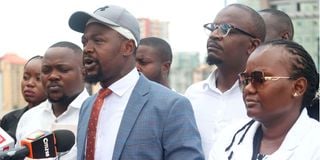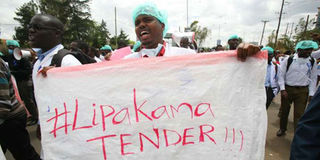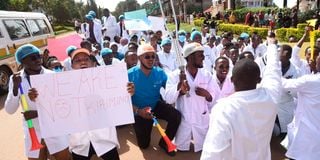Premium
Doctors’ strike: Listen to us, Mr President, medics tell Ruto

Kenya Medical Practitioners, Pharmacists and Dentists Union Secretary General Davji Atellah addresses journalists at the union's headquarters along Kindaruma Lane in Nairobi on March 18, 2024.
What you need to know:
- Health CS Susan Nakhumicha blamed the strike on 'cartels in my ministry'.
- Doctors' union calling for a meeting with President Ruto to 'put things in perspective'.
The countrywide doctors’ strike entered its 10th day yesterday, with union officials calling for a meeting with President William Ruto to “put things in a proper perspective”.
The call came from Kenya Medical Practitioners, Pharmacists and Dentists Union (KMPDU) Deputy Secretary-General Dennis Miskellah, who said the President is being fed on wrong information about the strike.
“We believe the President is getting misinformed on a number of issues we have raised. The union feels he is the one who will listen to us if we are given time to explain,” Dr Miskellah said.
Health Cabinet Secretary Susan Nakhumicha on Friday blamed the strike on “cartels in my ministry”.
Speaking at a funeral in Trans Nzoia County, Ms Nakhumicha said she is determined “to crush cartels, especially those at the Kenya Medical Supplies Authority (Kemsa)”.
While explaining why it is important to have Dr Ruto handle the matter, Dr Miskellah gave the example of the Cabinet Secretary saying she needed Sh5 billion to hire medical interns and Sh10 billion for all the healthcare interns.

Striking doctors protest outside Afya House in Nairobi during a past job boycott.
According to Dr Miskellah, the government only needs Sh1.4 billion to have the interns posted.
“If we have doctors’ interests at heart, we need to tell the truth. We are dealing with a sensitive matter that involves lives. The more we prolong it, the more the likelihood that lives will be lost,” Dr Miskellah said.
“This is why we believe President Ruto is being misinformed. He should listen to us.”
The unionist added that the matter of interns should not even have been part of the discussions “but it is an agenda since the Ministry of Health failed to budget for them”.
“There is always a budget for interns in every government. The numbers completing university every year are ready for posting. Are we saying the name ‘intern’ is the issue and not the money? We just need an hour with the President,” he said.
“We are not going to talk about internship. It is the minister’s problem and she has to fix it. She is the one who forgot to budget for them. We want to talk about comprehensive issues like hiring more doctors and how to implement the primary healthcare network.”
Union officials countrywide were unrelenting in their demands.
Coast Regional KMPDU Secretary, Ghalib Salim, said the work boycott would continue until the ministry listens to doctors’ cries.
Dr Salim added that hospitals are in a state of semi-paralysis, operating with less than 10 per cent of doctors.
“Most hospitals in Mombasa have shut. Only clinical officers are working. There will be complete paralyisis next week as doctors hope to see the other healthworkers join them in the strike,” he said.
Trans Nzoia County KMPDU Liaison Officer, Francis Soita, said no negotiations between the union and the devolved government have started.
The 46 public hospital doctors in West Pokot County are not on duty. Dr Gilbert Korir, a KMPDU official, said members would not resume work until interns are posted.
KMPDU leaders and government officials met on Thursday and agreed to form a 13-member committee that will look into the issues raised by the striking doctors.
The talks were ordered by the Employment and Labour Relations Court. The team is expected to present its report tomorrow.
Patients and their families across the country have borne the brunt of the strike, with some opting for private hospitals or traditional medicine.
There was chaos at Kenyatta National Hospital, Nairobi, on Friday.

Medical interns camp outside Afya House, the Ministry of Health headquarters, in Nairobi on February 12.
The Maternity Wing and the Emergency Unit witnessed an unbearably high number of patients but few healthcare workers.
Emergency and critical service doctors have joined their striking colleagues.
Also Read: Talks to end doctors' strike collapse again
Several wards remained deserted at Kisumu County Referral Hospital yesterday, with just a handful of patients lying on beds. Some of their kin were around, looking dejected.
Ms Dorothy Odhiambo was among the many patients allowed to go home despite not having recovered.
The 49-year-old diabetic told the Sunday Nation that she visited the hospital two weeks ago and her right leg was amputated days later.
“All the doctors have been out of work. Only the nurses have been attending to us,” Ms Odhiambo said.
“That is why we have been discharged. My wound is still fresh and I am afraid it may develop an infection if not attended to by professionals.”
Ms Odhiambo said many patients had left the ward when the doctors’ strike began but she chose to remain at the hospital, hoping to be attended to by healthworkers.
However, she decided to go home in the afternoon, leaving behind only one patient in the female surgical ward.
A guard at the hospital said most of the patients in the wards had been picked up by their families.
“Many of those admitted have already been picked by their relatives and friends. The hospital is only offering outpatient services,” the guard said.

Doctors demonstrate in Eldoret town, Uasin Gishu County on March 01, 2024, over the attack of medics' union Secretary General Dr Devji Atellah.
In Uasin Gishu County, some of the patients contacted said they have resorted to medicinal herbs, leaves and roots as doctors stay away from hospitals.
Herbalists, including those from neighbouring counties, have flocked Eldoret, cashing in on desperate people seeking treatment for various ailments.
A spot-check by the Sunday Nation in Eldoret town found herbalists from as far as Kilgoris, Kajiado and Narok with coloured liquids in five-litre containers seeking customers.
Those interviewed said business is booming.
“I used to attend to three to four customers daily before the doctors’ strike. I now get double or triple that number,” said Kaika ole Kaitei, one of the mobile herbalists.
“Some people have doubts about traditional medicine but with this strike, many are coming to us. It appears their families cannot afford private hospital treatment.”
Doctors at Nakuru Referral Hospital complained of being threatened and forced to sign an attendance book by county authorities but patients were not being attended to.
The number of patients visiting the hospital, particularly those seeking specialised treatment, has drastically fallen since the strike began.
“Once in a while, a specialist comes in the morning, prescribes medicine to patients and leaves in a huff,” a hospital worker said yesterday.
“Many are turned away as specialists like urologists, oncologists and orthopaedics are not working while the theatre list is growing by the day due to postponements. To be honest, the system is not working.”
However, public hospitals in Kericho and Bomet counties are still operational, despite the strike in other regions.
- Reporting by Angela Oketch, Angeline Ochieng, Francis Mureithi, Vitalis Kimutai, Evans Jaola, Oscar Kakai and Barnabas Bii




